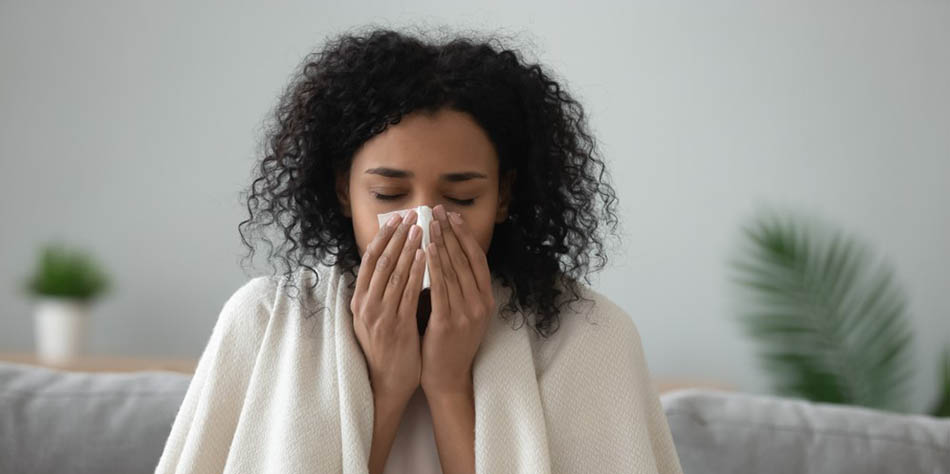
Your heart rate can hold important information about your health.
If you've ever noticed that you have an elevated heart rate when sick with a cold or virus, you might be curious, concerned or both. The body can seem like a mystery, but there's often an explanation. Any time your immune system is activated, your heart works harder to pump blood and oxygen to the body, leading to an increased heart rate. So, an elevated heart rate is a sign your body is doing its job to defend against illness.
Your heart rate — or pulse — is one of the vital signs doctors use when assessing health status and diagnosing illness. (The other vital signs are blood pressure, breathing rate, temperature and pulse oximetry, which measures oxygen levels in the blood.)
Your heart rate is determined by the number of times your heart beats each minute. For most adults, a normal heart rate lies between 60 and 100 beats per minute. Lower is generally better than higher, but you don't want it to be too low.
Why does your heart rate increase in response to illness?
Whether it's the flu, COVID-19, a virus or any other illness, you may notice your heart rate goes up when you get sick. There are several reasons for this, including:
Fever
Normal body temperature is about 98.6 degrees Fahrenheit, though it may be slightly higher or lower for some people. When your body is fighting off an illness, your normal resting temperature often increases. According to the Centers for Disease Control and Prevention, a temperature of 100.4 F or higher is considered a fever in adults. As your temperature rises, so does your heart rate.
Dehydration
Being sick can lead to dehydration, especially if you experience diarrhea, vomiting or lack of appetite. This in turn can increase your heart rate. If you're not feeling well, make sure to drink plenty of water and electrolytes to replace fluid loss.
Stress
Being sick is no fun. You may be worried about things you're not able to handle at work or feel compelled yet unable to take care of your family. These stresses can add to the physical stress your body is under as a result of your illness. As part of your body's stress response (fight or flight response), your heart rate increases.
Medications
Both prescription and over-the-counter medications can lead to an elevated heart rate when you're sick. That includes cough and cold medications. Medications you take for other conditions — such as high blood pressure and thyroid disease — can also raise your heart rate.
What factors affect your heart rate?
Many other factors can figure into your heart rate aside from illness. These include:
Age
Babies and children often have higher heart rates than adults. For example, a normal resting heart rate for a 3- or 4-year-old child is 80 to 120 beats per minute.
Exercise and activity
Heart rate is generally lower when you're at rest. When you stand up or start to move around, your heart rate goes up to push more oxygen through your body. The more vigorously you exercise, the higher your heart rate rises. However, because regular exercise builds heart muscle, it can actually lower your heart rate overall. People who exercise frequently often have heart rates below 60, or even below 50, when at rest.
The opposite is also true: If you don't get much exercise, your heart has to work harder to pump blood through your body at all times, leading to a higher resting heart rate.
Alcohol consumption
Researchers have found that just one drink can raise your heart rate as much as five beats per minute in the first six hours after drinking. The more you drink, the longer the effects last.
Smoking
Smoking can increase heart rate. Tobacco smoke contains carbon monoxide, which reduces the blood's oxygen content. Nicotine also increases heart rate.
Caffeine and other stimulants
Caffeine and other substances that stimulate the nervous system make your heart beat faster.
How can you avoid getting an elevated heart rate when sick?
An elevated heart rate isn't a cause for concern when you're sick, but the best way to avoid it is to avoid getting sick altogether. Here are some tips for preventing illness:
Keep up with your immunizations
This includes vaccinations against flu, COVID-19, HPV, tetanus, diphtheria and whooping cough (Tdap) for adults age 19 to 49. Adults over age 50 should add the shingles vaccine, and those over 65 should get the pneumonia vaccine, too. Vaccination is the most effective way to reduce your risk of getting these illnesses — and to avoid serious complications if you do get sick.
Prevent the spread of germs
Avoid close contact with people who are sick, wash your hands thoroughly and often with soap and warm water, and practice other healthy habits. And, as always, support your overall health with nutritious foods and regular exercise, and avoid smoking and excessive alcohol use.
If you notice an elevated heart rate when you're under the weather, it's probably just your body doing its job to fight off illness. However, if you experience shortness of breath, fatigue, chest pain, confusion, severe dehydration or other symptoms, seek immediate medical attention.
$webqFacilityNumber
Need a Physician?